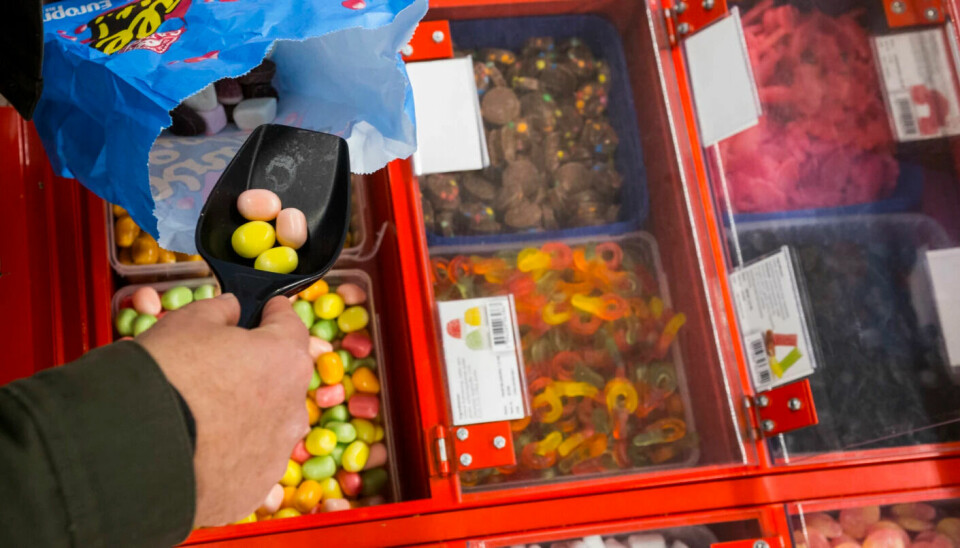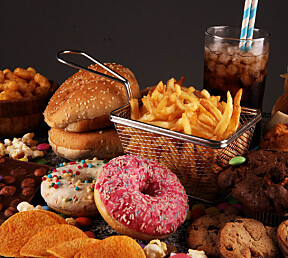
What happens in our bodies when we eat sugar?
ASK A RESEARCHER: Jelly babies, vanilla fudge, cola bottles, or giant strawbs – most people have their favourite sweets. But what actually happens in the body when we eat sweets?
We asked Professor Simon Erling Nitter Dankel, who researches medicine and biochemistry at the Mohn Nutrition Research Laboratory at the University of Bergen.
Dankel explains that one of the first things that happens in the body when we eat sugar is something called the ‘dessert stomach effect’.
The effect is that the stomach expands and empties faster when exposed to sweets.
“There are receptors in the stomach that sense something sweet. It can help relax the stomach, causing it to expand,” Dankel says.

He explains that this can also be a reason why it is easier to overeat sweet food.
Happens quickly
Imagine a Saturday evening watching your favourite TV show. You enjoy a bowl of your favourite sweets. But how quickly does the body react to what you eat?
The reaction in the stomach happens relatively quickly after eating sweets, Dankel explains. This is partly because sugar is easy to digest.
“Sugar is a refined ingredient that is highly degraded. It has no structure that the digestive system needs to break down, so when sugar meets the liquid in the stomach, it dissolves,” he says.
Does sugar make you hyper?
We often hear that children should not be given sweets in the evening because it makes them hyperactive. But is this really true?
Because sugar is so easy to digest, blood sugar rises quickly after we eat it. Often, we also eat a larger amount when consuming sweets. This contributes to the rise in blood sugar.
Over time, blood sugar levels decrease, often ending up slightly lower than the starting point, Dankel explains. This low blood sugar is associated with increased food intake, irritability, and nervousness.
“But I have some doubts about hyperactivity,” Dankel says. “If you imagine children's birthday parties where a lot of sugar is consumed, for example, there may be many social factors that also come into play. So I can’t speak about this with certainty.”
Sugar-loving gut bacteria
After the sweets pass through the stomach, they move on to the intestine. There are certain gut bacteria that thrive when supplied with sugar.
“There is some data suggesting that it can lead to an accumulation of specific types of bacteria in the gut, which can suppress other types of bacteria that are more beneficial to have,” Dankel explains.
He also emphasises that the gut microbiota is an area that is still being extensively researched.
“So we don't know the significance of this for sure yet,” he says.
May cause fatty liver
Sugar consists of two different carbohydrate molecules: glucose and fructose. Dankel explains that while glucose can be absorbed directly into the blood and proceed to the muscles, fructose is carried to the liver and is transformed and utilised there.
“High intake, especially of fructose, such as in the form of sugar, is associated with increased fatty acid synthesis in the liver,” Dankel says.
Fatty acid synthesis means that the liver produces saturated fat. Glucose also leads to fatty acid synthesis, but fructose has a more direct route to the liver, and therefore ends up there to a greater extent.
“So consuming a lot of sugar stimulates fat storage in the liver. This is associated with fatty liver, which can disrupt energy metabolism in the body,” Dankel says.
In addition, fatty liver is associated with several lifestyle diseases.

The brain likes sweetness
Eating sugar has various effects on the body. But what about the brain?
“There are nerve signals between the brain and the intestine, and the brain and the liver, that go both ways,” Dankel says. “It seems that the brain has a strong preference for a sweet taste. We see it, for example, in children, that they enjoy getting sugar. It's a type of food that we really crave.”
Dankel explains that the craving for sugar is related to a reward response in the brain triggered by the happiness hormone dopamine.
It is possible to reduce cravings by eating less sugar.
“It has a self-reinforcing effect. The more sweet food you eat, the more you may feel like having sweets,” Dankel says.
May increase the risk of dementia
In addition to stimulating the reward response in the brain, the brain also uses sugar as energy.
“If someone consumes little sugar and carbohydrates, or energy in general, they can enter a state called ketosis,” Dankel says.
Ketosis works by burning fatty acids, producing something called ketones. The brain can use ketones as energy instead of carbohydrates. Ketones also help suppress appetite.
“There are also studies suggesting that ketosis can protect against dementia, among other things,” he says. “In dementia, brain cells are no longer able to utilise sugar as effectively. Ketones can serve as a replacement, helping brain cells function better.”
On the other hand, if there is a high intake of sugar over time, and, for example, insulin resistance develops, the brain can receive an excessive supply of glucose. This can increase the risk of dementia.
“We see this also in diabetes, where there is an increased risk of dementia,” Dankel says.
———
Translated by Alette Bjordal Gjellesvik.
Read the Norwegian version of this article on forskning.no




































